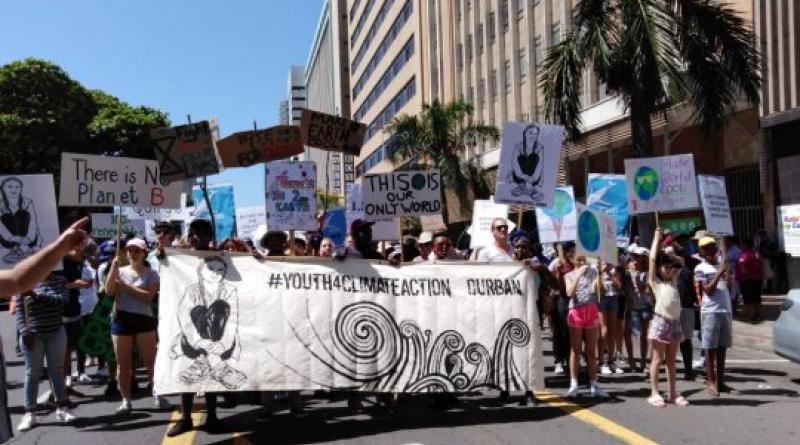Empowering women and youth for transformative climate and environment justice.

At the beginning of March, Tracy Kajumba was a panellist at the OECD Global Forum on Environment. Here she reflects further on how women and youth can be enabled to strengthen environmental justice.
Environmental justice and climate justice principles are mutually reinforcing, covering respect for rights, fairness, equity, participation, people and ecosystems among others.
Reflecting on the role of women and men, boys and girls, in local and global environment and climate movements is important, not only to understand their situation and means of empowering them but also, to realise the transformation they can make if supported.
Why do women and youth need empowerment?
Poor governance prevails worldwide, resulting in poverty and exclusion in society. Although central to changing this, civil society organisations (CSOs), social movements, youth (women and men in their late teens and twenties) and women’s organisations still face challenges in holding governments to account for how they make decisions, implement policies and allocate public resources.
Decisions are taken in siloes and without wide consultation.
The social movements’ call of ‘’nothing about us without us’’ is key to environmental and climate justice being achieved. But IIED’s work to amplify indigenous voices on the Sustainable Development Goals shows that indigenous women, for example, have difficulty in contributing to sustainable development policies that support their needs.
The IIED gender equality, voice and power theory of change notes, therefore, the need to include women and gendered local experience in policy debates – they have the potential to disrupt dominant policy discourse and ground technical debates in practical realities.
The human rights-based approach to development is vital but is sometimes viewed by national governments as opposition. This is reflected in the sustained assault on civic space. Prescriptive legislation, restrictions on foreign funding and a clampdown on organisations critical of government responses to human rights issues, have been on the rise.
More positively, powerful protests on everyday issues, including environment and climate change, have increased, largely led by young people.
Progress is not possible until governments, communities and civil society feel shared ownership in protecting the environment and addressing the impacts of climate change.
How can empowerment be supported for women and youth?
-
Economic empowerment: women and youth organisations can be more effective if they have funding to support their advocacy campaigns and to address their needs and priorities. However, the current model privileges bigger, more established players, ignoring smaller CSOs operating at the grassroots with women, youth and indigenous groups.
Lessons learned on the effectiveness of small grants for reaching vulnerable households in Uganda found that when funders simplified stringent requirements for accessing finance, the number of awards doubled and there was a 50% reduction in the timeframe for awarding the grants.
IIED research experience around decentralised climate finance models has proved that it is possible to be flexible and move away from ‘business as usual’ approaches. -
Building resilient institutions and strong leadership capabilities: organisations must be resilient with strong leadership to respond to disruptive changes. A shift is needed from emphasis on project funding towards providing incentives to build long-term capabilities of people and their institutions.
Funders should invest in supporting social movements and grassroot institutions, increasing their independence to hold governments to account and to address environment and climate justice, especially for those left furthest behind. -
Supporting grassroot organisations to generate credible evidence: national governments sometimes ignore policy positions put forward by CSOs, questioning their evidence base and the feasibility of their propositions. However, CSOs can play an important role in providing data and evidence based on actual need, lived experiences and knowledge of local issues.
The youth groups involved in climate and environmental justice campaigns have also raised the need for support to understand national and global policies and frameworks to inform their advocacy agenda.
Universities can play a role in supporting local institutions, as well as environment and climate champions. IIED and the International Centre for Climate Change and Development (ICCCAD), with a group of social movements, are discussing the possibility of the Least Developed Countries Universities Consortium on Climate Change supporting social movements in their countries to co-design and co-produce research evidence to inform national policy processes. -
Supporting young people to access information, use different tech options and inform decision and policymaking: the 2018 OECD Youth Stocktaking Report shows that, while young people are better educated and more informed than previous generations, they have less income at their disposal than previous young generations and are significantly underrepresented in decision-making positions. Hence, they have fewer means to shape the policies that affect them most – rising inequality and exclusion.
While youth participation in formal institutional politics is falling, young women and men’s participation in new social movements, both online and offline, has gained momentum. The forthcoming OECD Global Report on Youth Empowerment and Intergenerational Justice will highlight the impact of laws, policies, institutional capacities and processes to empower young people for environmental and intergenerational justice.
Making change happen in environment and climate justice processes
Grassroots groups, women’s organisations, youth groups and social movements are demanding greater climate ambition and protection of the environment. Governments and other institutions would be wise to support them to engage with development processes, to avoid responses likely to increase insecurity, poverty and intergenerational inequality.
Their voices can increase ambition and urgency to implement the global frameworks for sustainable development.
The recent initiative announced by the Scottish International Development Alliance, calling for civil society and government to collaborate on policymaking to make Scotland a leader in its approach to sustainable development, speaks to this.
Gender champions in IIED will support building evidence on just policies and decisions. We will make sure that the agency, voice and rights of these socially excluded women, men, young people and their organisations are brought to the forefront so that they can engage and share their experiences both at local and global levels.
14 May 2020
iied




